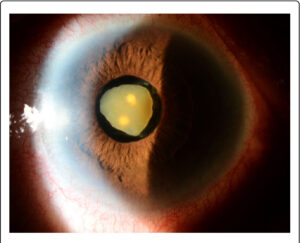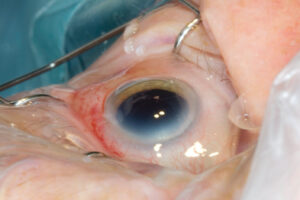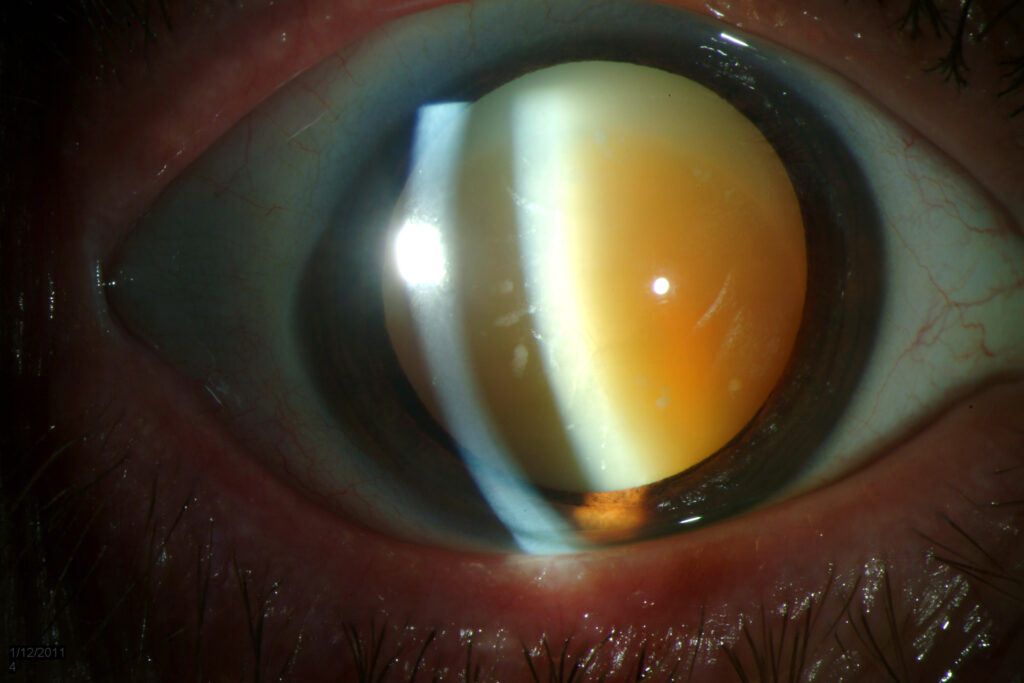If you are experiencing vision problems, it’s important to get them checked out by an eye doctor as soon as possible. One condition that you may be diagnosed with is hypermature cataract. This serious eye condition can cause a number of symptoms, and if left untreated, can lead to blindness. In this blog post, we will discuss what hypermature cataract is, the symptoms associated with it, and how it is treated.
Defining Hypermature Cataract

Hypermature cataract is a condition that causes the lens of the eye to become opaque. This opacity can cause a number of symptoms, including decreased vision. It usually develops due to another eye condition, such as glaucoma. Hypermature cataract is a serious condition that can lead to blindness if left untreated.
It is important to note that not all cataracts are the same. There are different types of cataracts, and each type has its own set of symptoms and treatment options. Hypermature cataract is just one type of cataract. It differs from other types of cataracts in that it is usually caused by another eye condition.
Moreover, the symptoms of hypermature cataract are usually more severe than the symptoms of other types of cataracts. And, finally, hypermature cataract usually requires different treatment than other types of cataracts.
Causes
The causes and reasons for hypermature cataract development are not always clear. In most cases, hypermature cataract is caused by another eye condition, such as glaucoma. Glaucoma is a condition that damages the optic nerve. This damage can cause a number of symptoms, including vision loss.
It is important to note that not all cases of hypermature cataract are caused by glaucoma. There are other conditions that can lead to the development of hypermature cataract. These include:
- diabetes
- high blood pressure
- certain medications
Some other non-medical reasons that have been linked to the development of this condition include:
- smoking
- excessive alcohol consumption
- prolonged exposure to ultraviolet (UV) light
- having high sugar in diet
It is important to stay mindful of these risk factors, as they can increase your chances of developing hypermature cataract.
Symptoms
The symptoms of hypermature cataract can vary depending on the severity of the condition. In general, however, patients with this condition will experience some or all of the following symptoms:
- Decreased vision
- Blurry vision
- Halos around lights
- Sensitivity to light
- Double vision
While these symptoms may be similar to other eye condition such as glaucoma, it is important to see an eye doctor if you are experiencing any of them. Only a trained medical professional can properly diagnose and treat hypermature cataract. The key difference between hypermature cataract and other conditions is that hypermature cataract usually leads to a rapid deterioration of vision.
Side Effects
The side effects of developing hypermature cataracts can range from mild to moderate to severe. This can include effects such as:
- Dry eye: This may happen due to the body not producing enough tears.
- Irritation: The eyes may become irritated due to the build-up of proteins on the surface of the eye.
- Eye pain: This may be caused by the inflammation of the eye.
- Headaches: This may occur due to the increased pressure in the eye.
- Nausea/Vomitting: When the optic nerve is damaged, it can cause nausea.
More severe forms of symptoms can also include:
- Blindness: In severe cases, hypermature cataracts can cause blindness by damaging the optic nerve.
- Inflammation of the eye: This may happen due to the body’s immune system reacting to the proteins on the surface of the eye.
- Retinal detachment: This may occur when the retina becomes detached from the back of the eye. For people with hypermature cataract, this may happen due to the increased pressure in the eye.
These side effects are usually the result of the increased pressure in the eye that is caused by hypermature cataracts. If you experience any of these side effects, it is important to see an eye doctor as soon as possible. These symptoms could be indicative of a more serious condition and should be treated by a medical professional.
Diagnosis

The diagnosis of hypermature cataract usually starts with a comprehensive eye exam. During the exam, your eye doctor will check your vision and look for any signs of the condition. They will also ask about your medical history and any symptoms you may be experiencing.
Once they have gathered all the necessary information, they will be able to properly diagnose hypermature cataract and develop a treatment plan.
The type of tests that your eye doctor will use to diagnose hypermature cataract will depend on the severity of your symptoms. In some cases, a simple vision test may be all that is needed. In other cases, however, more extensive testing may be required. This could include tests such as an ultrasound or a CT scan.
Some other diagnostic tools and tests may also include:
- Visual acuity test: This measures how well you can see.
- Slit lamp examination: This is a special microscope that is used to examine the structures of your eye.
- Tonometry: This test measures the pressure inside your eye.
- Pupil dilation: This allows your doctor to get a better look at the back of your eye.
All of these are important in diagnosing hypermature cataract.
Treatment

The treatment for cataract will depend on the severity of your symptoms and how much the condition has progressed. In some cases, no treatment may be necessary. If your symptoms are mild and you are not experiencing any vision problems, you may just need to have regular check-ups.
In most cases, however, treatment will involve surgery to remove the lens of the eye. This surgery is called a cataract extraction. This is a relatively simple and straightforward procedure that can be done in an outpatient setting. In most cases, it takes less than an hour to complete.
After the surgery, you will need to wear an eye patch for a few days. You will also be given eyedrops to help prevent infection and promote healing. In most cases, patients can expect a full recovery within a few weeks.
Conclusion
In conclusion, we can say that hypermature cataract is a serious eye condition that can lead to blindness if left untreated. It is important to see an eye doctor as soon as you experience any symptoms. With early diagnosis and treatment, however, the prognosis is usually good.
If you have any questions or concerns about hypermature cataract, please do reach out to our experts. At EyeMantra we have a team of experienced eye surgeons, who will be happy to answer your any questions on cataract surgery, cataract surgery cost, cataract lens cost for different cataract surgery types- Phacoemulsification, MICS & Femto Laser Cataract . Call us at +91-9711116605 or email at [email protected] for inquiries.


